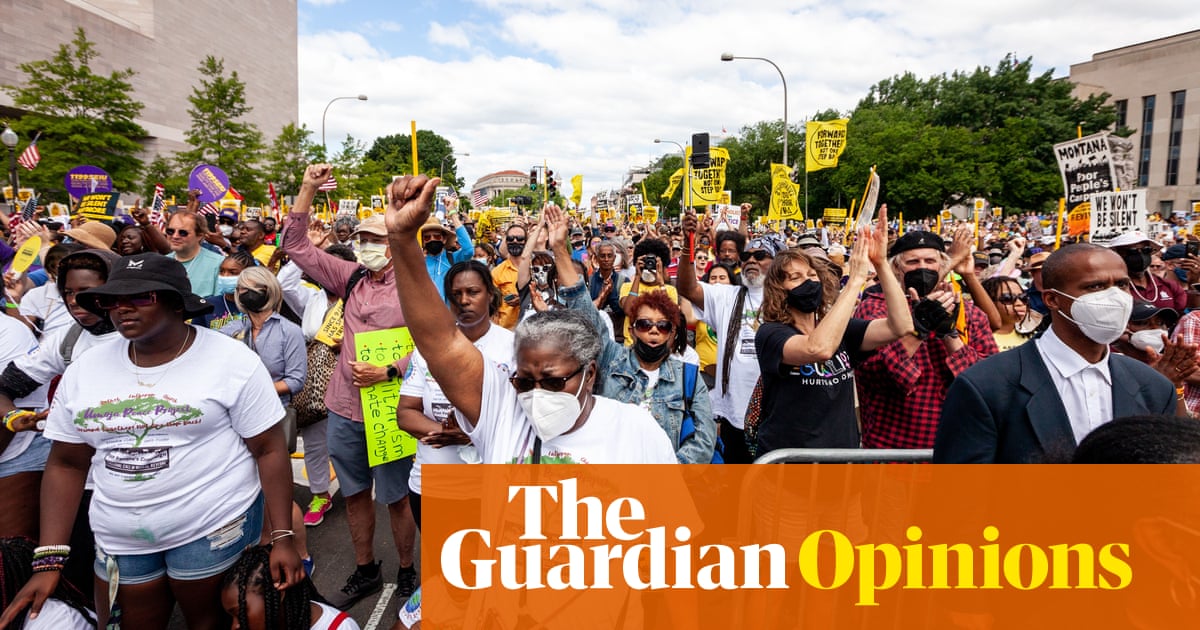When top figures in President Donald Trump’s orbit descended on a small town in southeastern Poland this week to rally support for the right-wing candidate in that country’s presidential election on Sunday, they put MAGA’s ambitions abroad on full display.
Homeland Security Secretary Kristi Noem called Karol Nawrocki “just as strong a leader” as Trump, declaring “he needs to to be the next president of Poland.” Matt Schlapp, chair of the pro-Trump Conservative Political Action Conference, which hosted the gathering, said electing candidates like Nawrocki is “so important to the freedom of people everywhere,” while John Eastman, who aided Trump’s effort to overturn the 2020 election, said Poland under Nawrocki would play “a critical role in defeating [the] threat to Western civilization.”
But if the conservative confab ahead of Poland’s vote was an indication of how hard Trump’s allies have been working to expand the MAGA brand across the globe, the results of recent elections, including in Romania, Poland and Canada, suggest Trump’s influence in some cases may not be helping.
“Just like domestically, you see one step forward, two steps back sometimes,” said Matthew Bartlett, a GOP strategist and State Department appointee in Trump's first administration. “The thought of Trump and MAGA is sometimes more powerful than the reality.”
He said, “His thumbprint can help push in certain regions and countries, but there can also be some pushback.”
Trump’s election to a second term in November emboldened far-right movements abroad. It gave Trump’s allies hopes of putting like-minded leaders into positions of power, boosting parties that share his priorities and spreading his populist, hard-right politics beyond the U.S. Meanwhile, conservative politicians in other countries yoked themselves directly or stylistically to his brand.
In the months since, far-right parties have performed strongly in European elections, including in Poland, Romania and Portugal, overperforming expectations and elevating their vote shares with electorates shifting to the right on issues like immigration. The hard-right in Europe, by most accounts, is surging. But they’re not vaulting into government like some Trump allies had predicted.
“I wouldn't say the right has ascended, I'd say it's a mixed package,” said Kurt Volker, who served as Trump’s envoy for Ukraine during his first administration and ambassador to NATO under George W. Bush. “There is a movement effect where the far-right movements seem to draw energy from each other and do well. But there's also this anti-Trump effect, where Trump has challenged a country or a leader and that has only backfired and helped them.”
In Romania, hard-right presidential candidate George Simion, who spoke at this year’s CPAC in Washington and appeared on Trump ally Steve Bannon’s podcast just days before the country’s election this month, lost to a centrist challenger after dominating the first round of voting. In Albania, conservatives hired former Trump co-campaign manager Chris LaCivita to boost their fortunes, only to see their candidate get trounced anyway.
And the movement is bracing for a close election on Sunday in Poland, where Nawrocki — who visited the White House earlier this month — is locked in a tight race with centrist candidate Rafal Trzaskowski after finishing behind him in the first round.
“We have a lot of political leaders here in the U.S. who are camping out in Poland to try to tilt it,” said Randy Evans, who was ambassador to Luxembourg during Trump’s first term. “Whether or not that's enough or not … I don't know. I think it's going to be very close.”
Trump’s allies have been working since his first term to expand MAGA’s influence abroad. Bannon, who had managed Trump’s 2016 campaign, began traveling across Europe pitching himself as the mastermind behind a new global far-right alliance called “The Movement.” He even announced he would set up an academy to train future right-wing political leaders at a former monastery outside Rome.
Those efforts largely fizzled at the time: Bannon’s planned academy got caught up in yearslong legal battles, and support for far-right parties across the continent tanked in the early months of the coronavirus pandemic.
But rising inflation and growing concerns over immigration helped far-right parties gain back support as the pandemic faded. By the time Trump won the election last November, many of those parties were resurging — and his victory emboldened them further, with far-right allies quickly seeking to tie themselves to the incoming U.S. president and his orbit.
When Vice President JD Vance chastised European leaders for “running in fear of [their] own voters” at the Munich Security Conference in February, he billed the Trump administration as an alternative model — the vanguard of a hard-right movement not only in the United States, but across the West.
“Make Europe Great Again! MEGA, MEGA, MEGA,” Elon Musk, Donald Trump’s billionaire ally, posted on X earlier this year.
In the months since the vice president’s appearance in Germany, hardline conservatives have had some success. In Portugal, the far-right Chega party surged. And Reform UK, the party led by pro-Brexit leader Nigel Farage, made big gains in the country’s local elections earlier this month.
CPAC, which has been holding international conferences since 2017 — including in Japan, Australia, Brazil and Argentina — gathered supporters in Hungary following the Poland meeting this week.
Schlapp did not respond to a request for comment. But he told NPR, “The one thing that's undeniable is that everybody wants to know where Donald Trump is on the issues that matter to their country” and said, “They're really rooting for Donald Trump to succeed.”
But elsewhere abroad, MAGA-style politics not only has failed to spread — it has been a liability. In both Canada and Australia, Trump’s combative and unpredictable trade policy led to an anti-Trump wave that helped tank right-wing candidates who sought to emulate his rhetoric.
Canada’s Pierre Poilievre ran on a “Canada First” slogan and Australia’s Peter Dutton proposed DOGE-style cuts to government. But Trump’s tariffs were deeply unpopular with voters in both countries, and even though Poilievre and Dutton distanced themselves from Trump in the final days of the campaign, voters punished them anyway.
Vance’s speech in February “gave the impression that this is becoming a transatlantic right-wing alliance,” said Liana Fix, a fellow for Europe at the Council on Foreign Relations in Washington. “Since then, the reality is … not as drastic as those worst-case scenarios. And that’s not because they’re not trying. You see how the White House is trying.”
Trump’s allies went all-in on the May 18 election in Romania, which was the re-run of a November vote annulled over concerns that a Russian influence campaign on TikTok had affected the outcome. Trump allies had criticized the decision to cancel the original results and bar the winning candidate, ultranationalist Călin Georgescu, from running in the new election.
MAGA loyalists spent months touting Simion, the hard-right candidate who promised to “Make Romania Great Again.” Less than two weeks before Election Day, Simion hosted CPAC’s Schlapp at a business roundtable in Bucharest, and two days before Romanian voters cast their ballots, Bannon hosted Simion on his “War Room” podcast.
“George, you've got the entire MAGA movement here in the United States pulling for you,” Bannon said, predicting victory for the Trump-aligned candidate.
But when the votes were counted, it wasn’t even close. Simion lost the election by 7 points to Bucharest Mayor Nicușor Dan, a centrist candidate who promised closer ties with the European Union and NATO.
In Albania’s May 11 parliamentary elections, where the conservative candidate, Sali Berisha, hired LaCivita to help his party make a political comeback, the party in interviews heralded Trump and Berisha’s “remarkably similar profiles” of being “persecuted by establishments” and “targeted by their countries’ justice systems.” Berisha’s supporters touted LaCivita’s involvement as proof Berisha was anointed by the MAGA movement.
But on Election Day, Berisha’s party lost badly, handing incumbent Edi Rama and his Socialist Party another term in office.
Rama wasted no time in gloating: Hiring Trump’s campaign strategist and thinking you can become Trump “is like hiring a Hollywood hairdresser and thinking you’ll become Brad Pitt,” he told POLITICO after the vote.
LaCivita told POLITICO on Friday that the connection between MAGA in the U.S. and conservative movements abroad stems from a common concern about an “alignment of issues — governments using their judicial systems to prosecute political opponents, the rising cost of living, reduced opportunities and individual liberties.”
“This alignment was defeated with President Trump’s win in 2024, and while that success may not always be repeated worldwide — once again America is being looked at to provide leadership in securing freedom,” he said in a text message. “Not through the barrel of a gun — but politics.”
Trump spokesperson Anna Kelly said in a statement that Trump’s “message of restoring common sense, halting illegal immigration, and delivering peace resonates with not just Americans, but people around the world, which is why conservatives have been winning elections in all corners of the globe. He is simultaneously restoring America’s strength on the world stage, as evidenced by the 15 foreign leaders who have visited the White House this term.”
Meanwhile, Trump’s allies have largely dismissed defeats abroad, with explanations ranging from blaming the “deep state” to arguing that losing politicians were not sufficiently Trumpian to win.
"MAGA's populist, nationalist, sovereignist right continues to rise despite the full force of the deep state being thrown against it,” Bannon told POLITICO in response to the spate of recent elections.
“These people aren’t Donald Trump. They’re facsimiles,” Raheem Kassam, a former Farage adviser and ex-Breitbart London editor, said of Simion and Nawrocki, noting that their parties are both part of a faction on the European level that has its roots more in traditional conservatism than the MAGA-style populism of far-right parties in Germany, Austria, France and others.
“They’re cheap copies that have been run through a copy machine 40 times,” he added. “It doesn’t work. It’s faded. It’s counterfeit Trumpism.”
Poland, where leaders of the right-wing Law and Justice Party have long cultivated ties to Trump and MAGA loyalists, will offer the next test of whether an affiliation with Trump can help put like-minded candidates over the finish line.
Nawrocki, the Law and Justice Party-backed candidate for president, has gone all-in on his efforts to tie himself to Trump — including flying to Washington in early May for a photo op at the White House.
“President Trump said, ‘you will win,’" Nawrocki told the Polish broadcaster TV Republika. “I read it as a kind of wish for my success in the upcoming elections, and also awareness of it, and after this whole day I can say that the American administration is aware of what is happening in Poland.”
But public opinion polling shows Poles, who have long been among the U.S.’ biggest fans in Europe, are souring on both the country and its current leader amid tariffs and Trump’s close ties to Russia — a tricky issue in a country where many people still view Russia as a threat.
Asked by a Polish public polling agency in April whether the U.S. has a positive impact on the world, just 20 percent said yes — the lowest figure since the poll was first conducted in 1987, and down from 55 percent a year ago. And 60 percent of Poles said they were “concerned” about Trump’s presidency, compared with just 15 percent who were “hopeful.”
“Trump is the most unpopular U.S. president in Europe,” said Milan Nic, an expert on Central and Eastern Europe at the German Council on Foreign Relations. “This means that to some supporters of Nawrocki, the photo from White House with Trump is no longer as powerful as it used to be.”
Volker, the former Ukraine envoy, said right-wing parties need to walk a tightrope of embracing some of the MAGA zeal — but without linking themselves too closely to the polarizing U.S. president.
“You have to think of Trump as like fire: You can't be too close, but you can't be too far away,” said Volker. “If you get too close to Trump you get burned, and if you’re too far away you’re not relevant.”

 German (DE)
German (DE)  English (US)
English (US)  Spanish (ES)
Spanish (ES)  French (FR)
French (FR)  Hindi (IN)
Hindi (IN)  Italian (IT)
Italian (IT)  Russian (RU)
Russian (RU)  1 day ago
1 day ago
























Comments